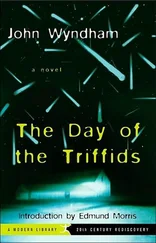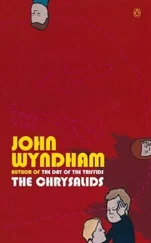John Wyndham - The Midwich Cuckoos
Здесь есть возможность читать онлайн «John Wyndham - The Midwich Cuckoos» весь текст электронной книги совершенно бесплатно (целиком полную версию без сокращений). В некоторых случаях можно слушать аудио, скачать через торрент в формате fb2 и присутствует краткое содержание. Жанр: Фантастика и фэнтези, на английском языке. Описание произведения, (предисловие) а так же отзывы посетителей доступны на портале библиотеки ЛибКат.
- Название:The Midwich Cuckoos
- Автор:
- Жанр:
- Год:неизвестен
- ISBN:нет данных
- Рейтинг книги:4 / 5. Голосов: 2
-
Избранное:Добавить в избранное
- Отзывы:
-
Ваша оценка:
- 80
- 1
- 2
- 3
- 4
- 5
The Midwich Cuckoos: краткое содержание, описание и аннотация
Предлагаем к чтению аннотацию, описание, краткое содержание или предисловие (зависит от того, что написал сам автор книги «The Midwich Cuckoos»). Если вы не нашли необходимую информацию о книге — напишите в комментариях, мы постараемся отыскать её.
The Midwich Cuckoos — читать онлайн бесплатно полную книгу (весь текст) целиком
Ниже представлен текст книги, разбитый по страницам. Система сохранения места последней прочитанной страницы, позволяет с удобством читать онлайн бесплатно книгу «The Midwich Cuckoos», без необходимости каждый раз заново искать на чём Вы остановились. Поставьте закладку, и сможете в любой момент перейти на страницу, на которой закончили чтение.
Интервал:
Закладка:
'Well, really!' objected Willers. 'If you can cite me a plainer case of hysterical remorse – hair-shirts, and all that – I shall be interested to hear it.'
'And Harriman, too?' Janet persisted.
For Harriman had one day made his appearance in Willers' surgery in a shocking mess. Nose broken, couple of teeth knocked out, both eyes blacked. He had been set on, so he said, by three unknown men – but no one else had seen these men. On the other hand, two of the village boys claimed that through his window they had seen Harriman furiously bashing himself with his own fists. – And the next day someone noticed a bruise on the side of the Harriman baby's face.
Dr Willers shrugged.
'If Harriman were to complain of being set upon by a troupe of pink elephants, it would not greatly surprise me,' he said.
'Well, if you aren't going to put it in, I shall write an additional report,' said Janet.
And she did. She concluded it:
'This is not , in my opinion, or in anyone's opinion but Dr Willers', a matter of hysteria, but of simple fact.
'The situation should, in my view, be recognized, not explained away. It needs to be examined and understood. There is a tendency among the weaker-willed to become superstitious about it, and to credit the babies with magical powers. This sort of nonsense does no one any good, and invites exploitation by what Zellaby calls "the beldame underground". There ought to be an unbiased investigation.'
An investigation, though on more general lines, was also the theme of Dr Willers' third report which was in the form of a protest that wound up:
'In the first place, I do not see why MI is concerned in this at all: in the second, that it should be, apparently, an exclusive concern of theirs is outrageous.
'It is disgracefully wrong . Somebody should be making a thorough study of these children – I am keeping notes, of course, but they are only an ordinary GP's observations. There ought to be a team of experts on the job. I kept quiet before the births because I thought, and still think, that it was better for everyone, and for the mothers in particular, but now that need is over.
'One has got used to the idea of military interference with science in a number of fields – a lot of it totally unnecessary – but this is really preposterous! It is nothing less than a scandal that such a phenomenon as this should continue to be hushed up so that it is going practically unobserved.
'If it is not simply a piece of obstructionism, it is still a scandal. It must be possible for something to be done, within the provisions of the Official Secrets Act, if necessary. A wonderful opportunity for the study of comparative development is simply being thrown away.
'Think of all the trouble that has been taken to observe mere quins and quads, and then look at the material for study that we have here. Sixty-one similars – so similar that most of their ostensible mothers cannot tell them apart. (They will deny that, but it is true.) Think of the work that should be taking place on the comparative effects of environment, conditioning, association, diet, and all the rest of it. What is going on here is a burning of books before they have been written. Something must be done about it before more chances are lost.'
All these representations resulted in a prompt visit from Bernard, and an afternoon of rather acrimonious discussion. The discussion broke up only partly mollified by his promises to stir the Ministry of Health into swift, practical action.
After the others had left, he said:
'Now that official interest in Midwich is bound to become more overt, it might be very useful – and, indeed, might help to avoid awkwardness later on – if we could enlist Zellaby's sympathy. Do you think you could arrange for me to meet him?'
I rang up Zellaby who agreed at once, so after dinner I took Bernard up to Kyle Manor, and left him there to talk. He returned to our cottage about a couple of hours later, looking thoughtful.
'Well,' asked Janet, 'and what do you make of the sage of Midwich?'
Bernard shook his head, and looked at me.
'He's got me wondering,' he said. 'Most of your reports have been excellent, Richard, but I doubt whether you got him quite right. Oh, there is a lot of chatter which sounds like hot air, I know, but what you gave me was too much of the manner, and too little of the matter.'
'I'm sorry if I misled you,' I admitted. 'The trouble about Zellaby is that his matter is frequently elusive, and often allusive. Not much that he says is reportable fact; he is given to mentioning things en passant , and by the time you've thought it over you don't know whether he followed them up with serious deductions, or was simply playing with hypotheses – nor, for that matter, are you at all sure how much he implied, and how much you inferred. It makes things difficult.'
Bernard nodded, understandingly.
'I appreciate that now. I've just had some of it. He spent quite ten minutes towards the end telling me that it is only recently that he has come to wonder whether civilization is not, biologically speaking, a form of decadence. From that he went on to wonder whether the gap between homo sapiens and the rest was not too wide; with the suggestion that it might have been better for our development had we had to contend with the conditions of some other sapient, or at least semi-sapient, species. I'm sure he wasn't being altogether irrelevant – but I'm hanged if I can really pin down the relevance. One thing seems pretty clear though; erratic as he seems, he doesn't miss a lot... Incidentally, he is strong on the same line as the doctor concerning expert observation – particularly on this "compulsion", but in his case for the opposite reason: he doesn't consider it hysterical, and is anxious to know what it is.
'By the way, you seem to have missed one trick – did you know his daughter tried to take her baby for a drive in her car the other day?'
'No,' I said, 'what do you mean, "tried"?'
'Just that after about six miles she had to give up, and come back again. He doesn't like it. As he put it: for a child to be tied to its mother's apron strings is bad, but for a mother to be tied to a baby's apron strings is serious. He feels it is time he took some steps about it.'
Chapter 14. Matters Arising
For various reasons almost three weeks went by before Alan Hughes was free to come for a week-end visit, so that Zellaby's expressed intention of taking steps had to be postponed until then.
By this time the disinclination of the Children (now beginning to acquire an implied capital C, to distinguish them from other children) to be removed from the immediate neighbourhood had become a phenomenon generally recognized in the village. It was a nuisance, since it involved finding someone to look after the baby when its mother went to Trayne, or elsewhere, but not regarded with any great seriousness – more, indeed, as a foible; just another inconvenience added to the inconveniences inevitable with babies, anyway.
Zellaby took a less casual view of it, but waited until the Sunday afternoon before putting the matter to his son-in-law. Reasonably certain, then, of a spell without interruption he led Alan to deck-chairs under the cedar tree on the lawn where they would not be overheard. Once they were seated he came to the point with quite unusual directness.
'What I want to say, my boy, is this: I'd feel happier if you can get Ferrelyn away from here. And the sooner, I think, the better.'
Alan looked at him with an expression of surprise which became changed into a slight frown.
'I should have thought it fairly clear that there is nothing I want more than to have her with me.'
Читать дальшеИнтервал:
Закладка:
Похожие книги на «The Midwich Cuckoos»
Представляем Вашему вниманию похожие книги на «The Midwich Cuckoos» списком для выбора. Мы отобрали схожую по названию и смыслу литературу в надежде предоставить читателям больше вариантов отыскать новые, интересные, ещё непрочитанные произведения.
Обсуждение, отзывы о книге «The Midwich Cuckoos» и просто собственные мнения читателей. Оставьте ваши комментарии, напишите, что Вы думаете о произведении, его смысле или главных героях. Укажите что конкретно понравилось, а что нет, и почему Вы так считаете.












